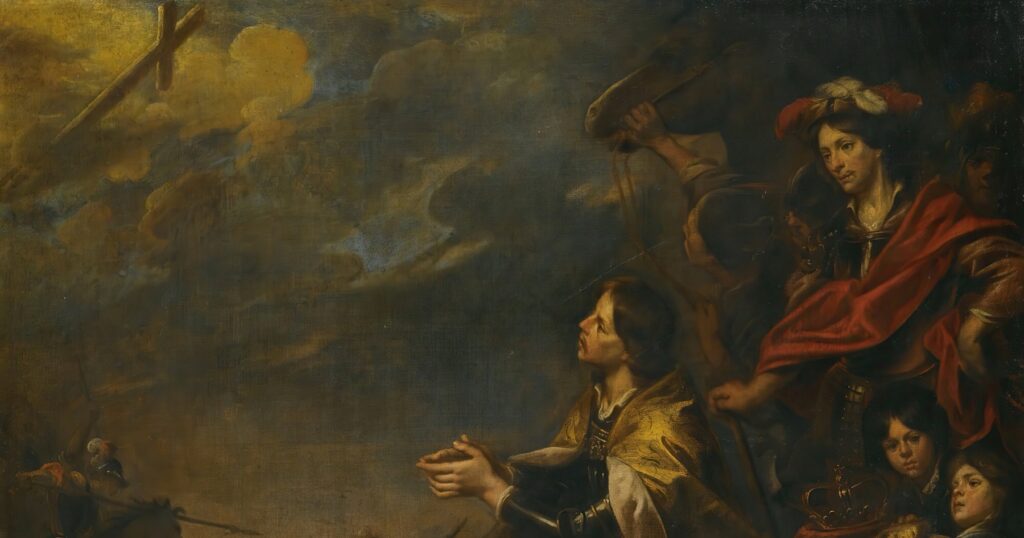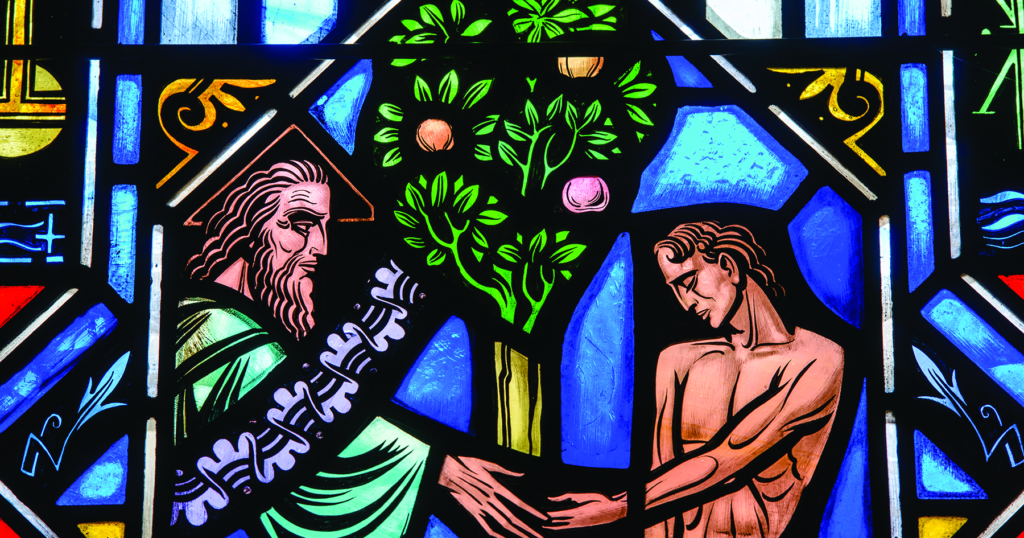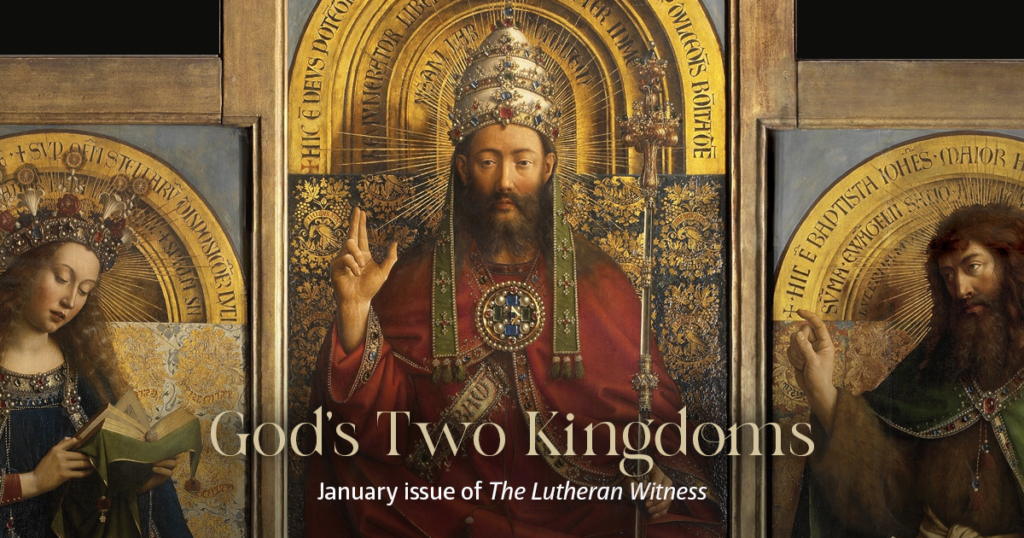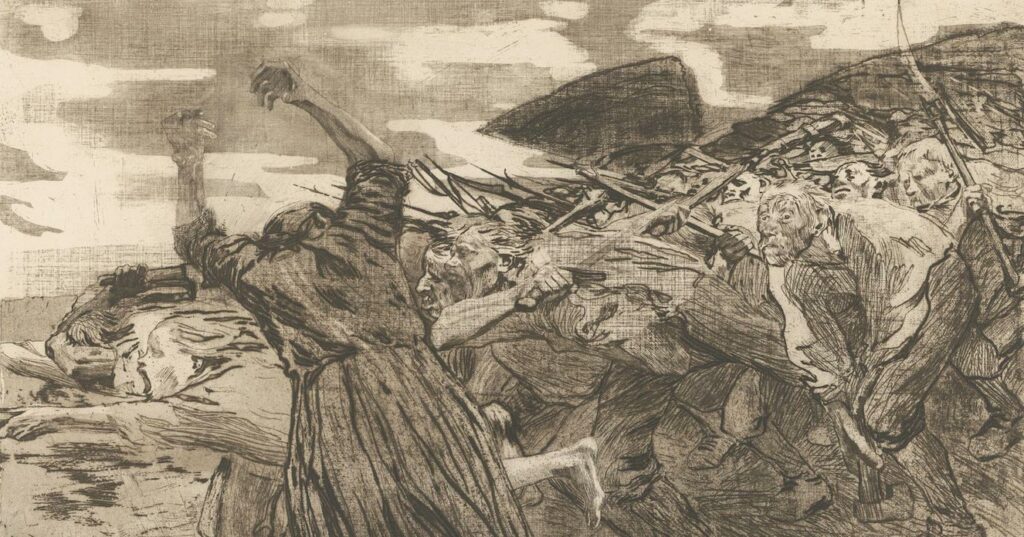by David Ramirez
We are blessed to be able to celebrate the 1700th anniversary of the Council of Nicaea this year. The lion’s share of attention will be rightly paid to the Nicene Creed, the triune nature of God, and heroic confessors of the faith such as Athanasius. However, we ought not overlook the man who convened the council — Imperator Caesar Flavius Valerius Constantinus Augustus. No bishop convened the council, and certainly no pope, but the ruler of the Roman Empire. In the calendar of commemorations in the Lutheran Service Book we remember him, and his mother Helena, on May 21.
It may be necessary to convince some that Constantine is worth both learning about and celebrating. There has long been a strain of Christian thought that has considered Constantine and his defense of the church misguided at best and a disaster at worst. At the time of the Reformation, the Anabaptists believed that the fall of the church coincided with the reign of Constantine and the melding of church and empire. To this day, many American Christians follow in their footsteps, denying that any type of supportive or cooperative relationship can exist between the church and civil government. Luther and the other reformers did not believe this to be the case nor evaluate church history in this fashion. It was the rise of the papacy, in conjunction with the teaching of salvation by works and elevation of monasticism, that led to spiritual tyranny over the church, home and civil government. Though they insisted on maintaining the proper distinction between ecclesiastical and civil authorities, the reformers praised Constantine, Theodosius and other Christian rulers who aided the church by convening councils, promoting unity, and combatting heresy.
In his Commentary on Psalm 101, Luther explained how these institutions could glorify God and properly aid one another. First, he described how spiritual authorities should be involved in secular matters by their preaching:
Now, if a preacher in his official capacity says to kings and princes and to all the world, “Thank and fear God, and keep His commandments,” he is not meddling in the affairs of secular government. On the contrary, he is thereby serving and being obedient to the highest government [divine authority].[1]
Next, Luther described how the secular authorities properly served the spiritual government:
If David or a prince teaches or gives orders to fear God and to listen to His Word, he is not acting as a lord of that Word but as an obedient servant. He is not meddling in spiritual or divine government but remains a humble subordinate and a faithful servant.[2]
Luther grounded his understanding of civil government and its duties toward God in creation, teaching that rulers are a type of father. In the Large Catechism he wrote, “Thus we have two kinds of fathers presented in this commandment, fathers in blood and fathers in office, or those to whom belongs the care of the family, and those to whom belongs the care of the country. Besides these there are yet spiritual fathers.”[3] Luther recognized the universal responsibility of all mankind to acknowledge and serve God in accordance with one’s particular station. All earthly rulers, whether of Israelite or Gentile nations, were expected to follow God’s Word. If they did not serve the Lord, like emperors Nero and Domitian, they would be held guilty by Him.[4] Luther maintained a consistently positive estimation of Constantine and other Christian rulers throughout his writings — especially their aid in resisting the grasping tyranny of the papacy. He held up David and the other faithful kings of Israel as examples of the universal duty of rulers to acknowledge and serve God.[5]
In a letter to Charles V (August 30, 1520), Luther, casting himself in the role of Athanasius, urged the Holy Roman Emperor to follow the example of Constantine in aiding a beleaguered church:
As earthly sovereigns are images of the heavenly Sovereign, they ought to imitate him. … It has finally seemed wise to appeal to Your Imperial Majesty, according to the example of St. Athanasius, in case the Lord deigns to help his cause through Your Imperial Majesty. Humbly and on my knees, therefore, I beseech Your Most Serene Majesty, Charles, foremost of kings on earth, to deign take under the shadow of your wings not me but the very cause of truth, since it is only by this truth that authority is given you to carry the sword for the punishment of the evil and the praise of the good.[6]
Though Charles V would not aid the Reformation, Luther was blessed with other faithful Christian rulers such as Frederick the Wise, John the Steadfast and John Frederick of Saxony who did so.
In harmony with Luther, Melanchthon formulated what would become the standard Lutheran teaching on civil rulers and the duties before God.[7] He made special mention of the example of Constantine:
Now when I say that the ruler is the person who maintains discipline, you must understand that he is to be the guardian of both tables of the Decalogue, that is, he shall serve not only as the protector of the peace — as a shepherd of the of a flock — not only as the guardian of our physical welfare, but primarily for the glory of God, as it pertains to outward morals. … Therefore, not only godly kings in Judah but also the kings of other nations, after they have learned the true teaching about God, have prohibited indignities against the true God, as is in the case of Nebuchadnezzar and Darius the Mede. Likewise, Constantine and Theodosius acted correctly when they destroyed idols. For though the ruler does not judge or change secret opinions in the minds of people, yet external sins he must prohibit for the sake of God’s glory, so that more people are not led astray by permissiveness and evil examples.[8]
Luther and Melancthon’s evaluations are an excellent testimony of what our forefathers in the faith thought of Constantine and other faithful Christian rulers. If our forefathers regarded Constantine so highly, it would be well worth our time to learn more about this great defender of the church and celebrate him as a Christian ruler who used his power and authority to glorify God.[9]
Along with convening the Council of Nicaea, Constantine is best known for defending the church during one of her darkest hours. Begun in 303 under Emperor Diocletian, the Great Persecution brought brutal violence upon Christians across the Roman Empire. God brought relief to His people through Constantine’s championing of the church and his devotion to the cross of Christ. Though a poor, miserable sinner, Constantine was made an instrument of God’s mercy toward His church. May we too be blessed with godly rulers in our day who will acknowledge and faithfully serve the Lord.
[1] AE 13:195.
[2] AE 13:195.
[3] LC The Fourth Commandment, 158.
[4] AE 13:68 and AE 45:126.
[5] A good example is Luther’s Commentary Psalm 101 (1534/5), AE 13:146–224.
[6] AE 48:177–8.
[7] James M. Estes, Peace, Order, and the Glory of God: Secular Authority and the Church in the Thought of Luther and Melanchthon (Leiden: Brill, 2005), 42–45.
[8] Philipp Melanchthon, The chief theological topics: Loci praecipui theologici 1559, trans. Jacob A. O. Preus, 2nd ed. (St. Louis, MO: Concordia Publishing House, 2011), 430–431.
[9] Good starting places for further study about Constantine would be Ecclesiastical History and Life of Constantine by Eusebius.
Cover image: “The Emperor Constantine’s Vision of the Cross Before the Battle of the Milvian Bridge,” Theodoor Boeyermans, 1620–1678.






Constantine, who had Arian sympathies, was instrumental in arranging the church councils at which Arianism was crushed. for the sake of peace and stability in the Empire. Today, we would tolerate no such interference. The Arians would be left free to preach as they saw fit and the State neither would nor should have any role in picking one faith, or variety of one faith, over another. Western Civilization has endured the Arian controversy, the Iconoclastic controversy, the invasion of Islam, various non-stop arguments during the Middle Ages, the Reformation, Peasants Wars, the Thirty Years War and the Napoleonic era. Everyone is sick and tired of the intervention of various religious authorities in State matters and welcomed the development of the concept of a rigid separation between the powers, funding and oversight of the State and the panoply of religions now on the landscape. If we revert back to some kind of “Christian” nationalism, there will be civil conflict and we will have to re-learn these lessons from our ancestors.
It would be interesting to know what sources the Lutheran Fathers had to assess Constantine. Commemorating Constantine as an “exemplary Christian ruler” goes too far. We can be grateful for his efforts to strengthen Christ’s Church and weaken paganism, but we must reckon with his reign’s whole history. The same Constantine who toppled idols and convened Nicaea remained Rome’s life-long pagan Pontiff, persecuted Nicene Christians, and was baptized by the arch-Arian bishop, Eusebius of Nicomedia. We can rightly rejoice in the good God granted through Constantine while placing the best construction on his conflicting legacy. However, heaping a Christian commemoration upon him, just because the Reformers did so, is wrong. As a wise Ft. Wayne professor once told me, “Luther was wrong about some stuff … Get over it!”
RE: “Constantine and Theodosius acted correctly when they destroyed idols.”
And yet it may please God to let the wheat and the weeds grow together until His harvest (Matthew 13:24-30).
I’m glad Constantine legalized Christianity in the Roman Empire. But he had no business convening a church council, exiling people for heresy, spending tax money on churches, or tearing down pagan shrines. That’s why we have separation of church and state in our country. The Saxon founders of the LCMS emigrated to America to get away from German rulers meddling in church affairs–remember? Imagine President Trump summoning our Synod into special convention, deporting people for heresy, ordering tax dollars to be spent on church construction projects, and having bulldozers destroy synagogues, mosques, and Hindu temples. We do not live in a theocracy like ancient Israel. Granting freedom of worship to Christians? Good job, Constantine! Meddling in church affairs? Not so good.
“I understand that Constantine granted Christians freedom, and I agree with that point. However, it’s important to clarify that in the United States, we do not have an official ‘separation of church and state’ written into the Constitution. What we do have is a foundational principle, found in the First Amendment, which prohibits the government from establishing a religion or interfering with individuals’ freedom to practice their faith. This means the government cannot choose a religion for us, not that religion and public life must be entirely separate.”
Thanks for the article, and Luther’s thinking on church and state; most enlightening. Rev. Greg Seltz is right, he needs our encouragement and prayers.
Here’s a free link for [9] Good starting places for further study about Constantine would be Ecclesiastical History and Life of Constantine by Eusebius.
https://archive.org/details/anecclesiastical00euseuoft/page/n19/mode/2up
Melanchthon says the ruler is the guardian of both tables of the Law and should destroy idols. That’s so awesome! I hope we get rulers who do that. We should only have nativity displays in front of government buildings, not statues to Satan.
Melanchthon (and Luther) did not believe in freedom of religion, and lived in an era of absolute monarchs. Our Constitution gives EVERYONE (Christian, Jewish, Muslim, Hindu, atheist, Satanist, etc.) freedom to practice his or her beliefs. The government has no right to “destroy idols”–we call that religious persecution. What if the government doesn’t agree with your definition of an “idol”? Some Christians think it’s wrong to have a crucifix (“We worship a risen Savior, not a dead one”). Some Christians think statues of Mary or other saints are idolatrous. Should the government be able to destroy crucifixes and smash statuary as “idols”? Remember, those ancient rulers didn’t just ban Lucifer from the courthouse lawn. They banned pagan worship, entered and vandalized temples, and fined, imprisoned or executed pagan worshipers. Giving the government power to promote “good religion” is re-opening Pandora’s box. Keep government out of the religion business–period. Lutherans used to be strong supporters of church-state separation…what happened?